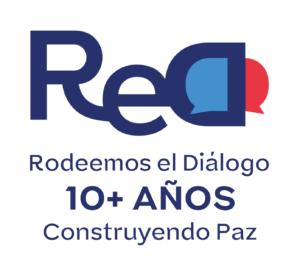8th Conversatorio de Paz – Bath, “Demobilisation and Reintegration of Ex-combatants in Colombia”
Moderator: Peter Cousins (University of Bradford)
Guest speaker: Francy Carranza (SOAS)
25th July 2014 @ 5.45 pm,
University of Bath, 1East, Room 2.4, Bath, BA2 7AY
Background
After half a century of armed confrontation between the Colombian army and the FARC guerrillas, 200,000 deaths, four failed peace negotiation processes and around six million people displaced from their lands, the Colombian government and this insurgent group are the closest they have ever been to signing a peace agreement. This process has been founded on a set of key points involving land distribution, cessation of drug trafficking, compensating the victims, political participation and their re-integration into society, and if successful will have a remarkable impact not just on Colombian society, but across Latin America as an example of social unity and reconciliation, and a triumph of dialogue over armed confrontation.
The outcome of the recent presidential elections guaranteed the continuation of the peace talks set up by centre-right incumbent Juan Manuel Santos. They unified sectors from the left and right, indigenous communities, victims and social organisations, supporting his re-election against an extreme-right candidate (Oscar Iván Zuluaga) who favoured an intensification of military action, seeing a terrorist threat while denying the armed conflict.
Currently, Colombia faces a very important moment of its history, with an economy growing at an annual average of 5% during the past ten years -supported by its large mineral and natural resources, stable democracy and security-, a real possibility of peace and a society exhausted by five decades of internal conflict and marked inequality. The conditions are then given for Colombia to enter a post-conflict phase, unifying and reconstructing its social and economic fabric that could trigger greater progress and equality.
One of the factors that will be key to this re-construction is the re-integration of demobilised guerrillas militants into civil society. This is a process in which Colombia has vast experience following the demobilisation of some 51,000 militants of paramilitary groups since 2003 and that requires special attention to assess the successes and failures during the execution of the process. Furthermore, it is the next point of the negotiation agenda in La Havana peace talks. Hence, the reason for the eighth Conversatorio organized by Rodeemos el Diálogo (ReD) to be held on 25th July 2014 at the University of Bath for which a brief and details are presented below.
Abstract
In 2003, the Colombian President Alvaro Uribe started a process of negotiation and demobilisation of paramilitary groups. Through terrorising the population and brutal attacks on civilians, these groups had achieved territorial control over a third of the country. At the same time Uribe launched a programme to foster desertion from the guerrilla groups, as part of his military strategy to defeat the guerrilla threat. As a result, members from both paramilitary groups and guerrillas entered into a process of disarmament, demobilisation and reintegration (DDR). Francy Carranza, our guest speaker for the eight event in our series of Conversatorios will be presenting her studies on the process of transforming combatants of these illegal armies into citizens, and analysis of the different aspects -psychological, social, economic and political- of reintegrating ex-combatants into society. This in order to contribute to the discussion regarding the theory and policy making on reintegration and post-conflict state-building, as well as looking ahead to a future demobilisation of FARC guerrilla soldiers.
Francy Carranza-Franco. PhD Candidate in Development Studies at the School of Oriental and African Studies (SOAS) in London. MA in Social Psychology (LSE) and a BA in Psychology (National University of Colombia). Her research focuses on the concept of citizenship and its relation with security in situations of war or conflict, specifically in the process of citizenship for former guerrilla and paramilitary members as a result of the Reintegration Process that took place in Colombia during Alvaro Uribe’s Presidency. She has worked at the Ministry of Education in Colombia and the Institute of Political Studies and International Relations (IEPRI) of the National University of Colombia. In 2012 she helped to create the group “Rodeemos el Dialogo” (which translates Let’s Surround the Dialogues).





